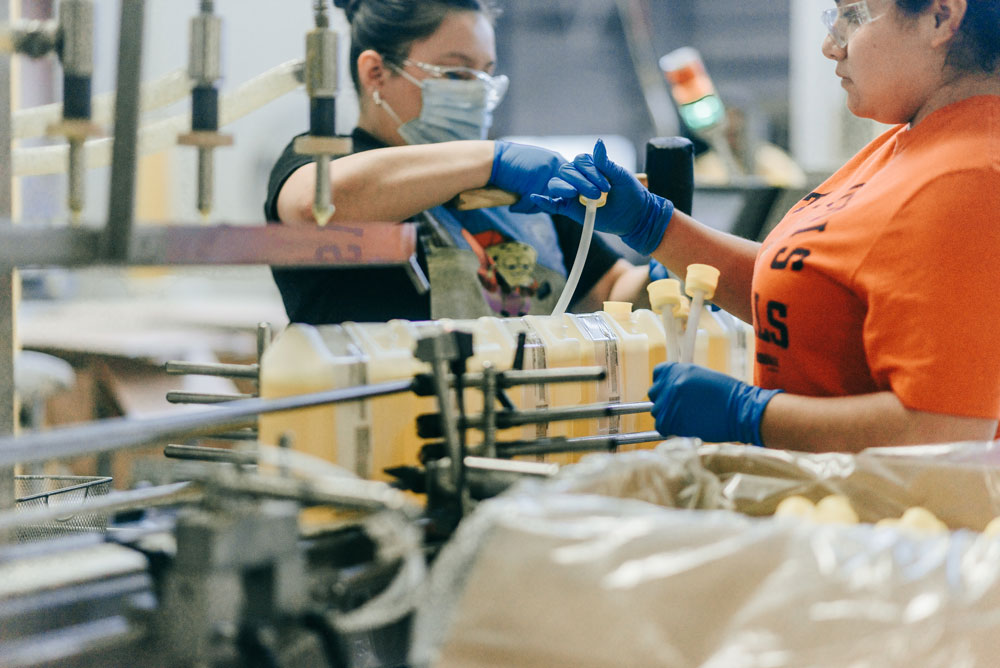How does documentation validate a vendor’s ability to produce and control quality from formula all the way to finished good?
When you hand off a formula and a product design to your liquid contract manufacturing vendor, there’s one word that should define that exchange: Trust. Customers and end users need to trust that the product they just bought will match the safety and quality of every other bottle they’ve purchased in the past. And that in turn means that, no matter how large your company, you need to trust your vendor to execute your product consistently across every bottle.
That’s a straightforward enough concept, but developing the processes that protect that trust is painstaking. Documentation is a critical aspect for a trustworthy liquid contract manufacturer. (It’s worth noting that not all liquid contract manufacturing vendors follow strict documentation protocols.) From procuring and receiving raw materials, right to shipping out the finished product, documentation is key for numerous reasons.
Lot Control and Lot Traceability
Lot or batch controls are broadly defined within manufacturing as the steps necessary to follow every single product as it flows through the process (in the case of PCI, a bottling process) all the way through to its final stop on the customer’s shelves. Put another way: Lot controls require an end-to-end process to allow for the tracking of a specific production batch/lot number of any product within the supply inventory.
In a general sense, lot control and traceability defines process that:
- Maintain quality assurance standards
- Create a cost-effective infrastructure in the event of a hold or recall process
- Reduce variances and errors
- Track inventory lots
- …and more
A true turnkey contract manufacturer’s documentation process should enable a fast and secure process to trace every single bottle right back to the day it was bottled. For example, at PCI, bottles are ink-jetted with relevant lot codes to identify the batch within which they were produced. That way if, for whatever reasons, a product needs to be recalled or has any safety or quality issues associated with it, the team can trace every bottle back to a very specific batch.
Lot controls should include the date and time, so from there the vendor can identify what corrective actions and investigations that need to take place. At our plant, we pull three bottles per production lot per shift every day.
We don’t stop there. As a part of our safety and documentation protocols we store those bottles in a temperature-controlled area and retain those samples for up to three years.
ISO Certification
ISO certifications indicate that a contract manufacturer follows the highest standards for quality and safety. ISO standards are a standardized set of quality controls that signal to clients that an organization is committed to achieving the highest standards of quality available within the industry.
Contract manufacturers that follow ISO or GMP manufacturing standards are required to manage and maintain a rigorous documentation process. In our industry, this ideally should include issuing production and batching paperwork in a standardized and repeatable process for every single batch.
Documentation is foundational to maintaining and managing those standards. Even the largest liquid contract manufacturing vendors, however, don’t necessarily adhere to strict documentation processes. PCI’s documentation standards run in parallel to ISO 9001 standards; our internal production and control systems are based on ISO 9001:2015 standards. These standards define all aspects of our manufacturing process from formula to finished good.
Testing and Quality Control
When brands develop formulas, they typically spend millions on R&D. Those brands need to work with vendors that extend that commitment to quality and testing when the production is handed off to a third party. Documentation is central to any testing and review processes.
A quality contract manufacturer will also have its own internal review and QC steps throughout the entire bottling process. Batch and quality control simply isn’t possible without the proper documentation. At PCI, our staff pulls bottles off the line every 30 minutes for different types of testing. These rigorous testing procedures include torque checks on the caps and trigger sprayers and weight checks to ensure bottles are filled properly.
There are also various types of QC checks that take place throughout the packaging and bottling process, all of which is documented.
Talk to PCI About How Our Documentation Standards Can Benefit Your Customers and End Users
At PCI, trust is foundational to everything we do. We know your customers trust your brand, and we take that relationship seriously. Our rigorous documentation and QC process is just one of the many standards we follow to verify quality from material sources to the finished goods when they arrive at your distribution center.
To learn more about working with PCI and our state-of-the-art production facility in St. Louis, contact us about starting a quote today.

